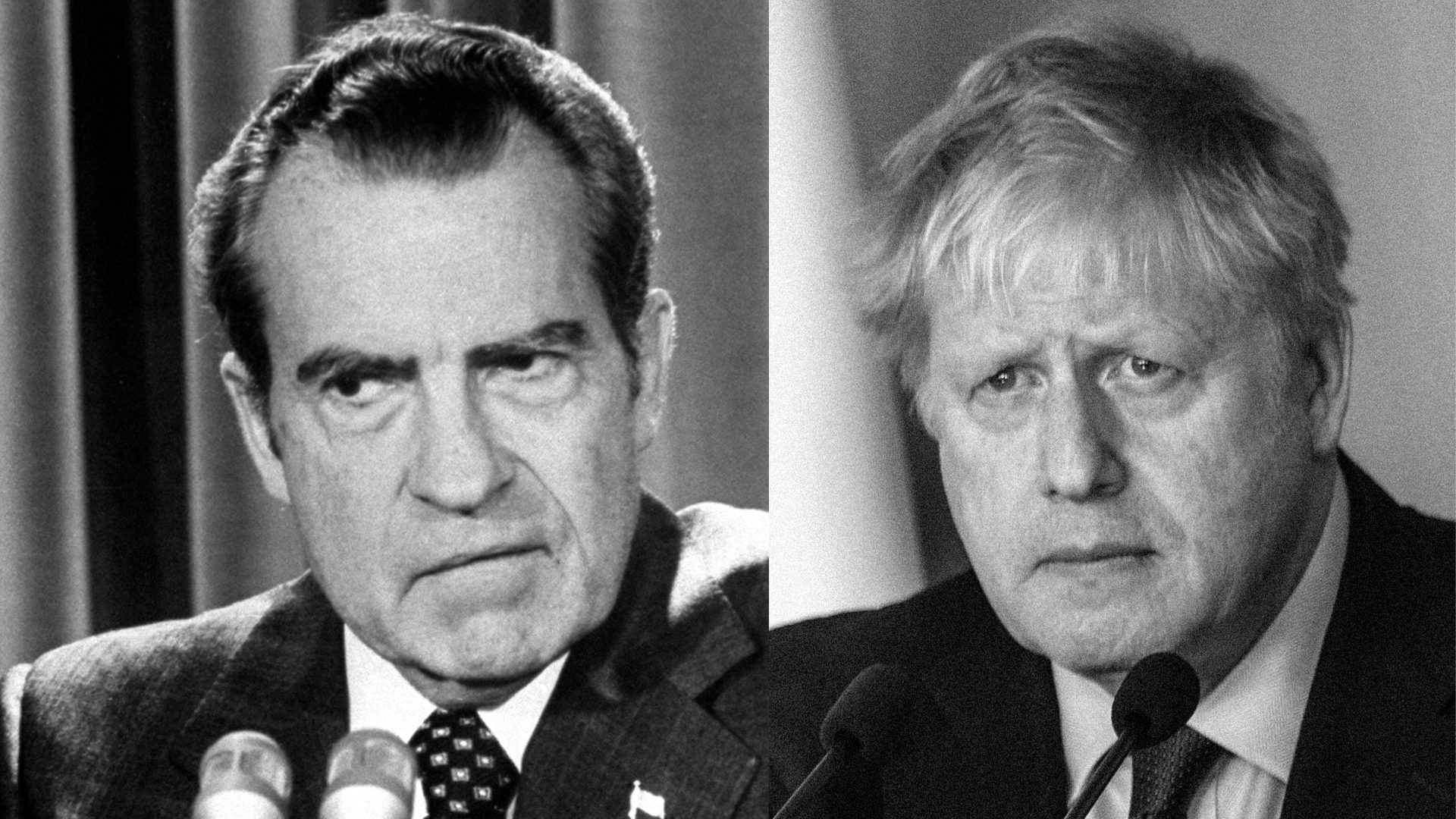When you are a politician seeking – against all the evidence – to re-establish yourself as an honest, credible, plain dealer, it is somewhat unfortunate to find yourself compared with Richard Nixon. Nevertheless, Boris Johnson’s House of Commons response to Sue Gray’s report on Partygate carried unmistakable echoes of Nixon’s notorious April 1973 televised address on Watergate.
Both men purported to be “appalled” by details of what had happened. Both claimed credit for ordering an investigation. Both trumpeted the reorganisation of their teams, and moved swiftly to a peroration on what the soon-to-bedisgraced US president called “the vital work ahead of us” – securing peace in south-east Asia, tackling inflation, and ensuring “a good job for everyone who wants to work” in Nixon’s case; combating Russian aggression in Ukraine and achieving a “high-wage, high-skill, high-employment economy” in Johnson’s.
But easily the eeriest similarity is how, just as Nixon did over the break-in at the Democrats’ election HQ, Johnson nominally took “full responsibility” – Nixon’s exact, if hollow, words – for serially illegal partying in Downing Street while simultaneously doing everything he could to absolve himself from blame.
Johnson did not, as Nixon so unwisely did seven months on from that address, announce that “I’m not a crook”. Instead, he blandly insisted that he had “in all sincerity” believed that he was breaching no Covid rules. He had merely been showing “leadership” by making farewell speeches at leaving dos. And so on.
While the chronically uneasy Nixon could never lie with Johnson’s supremely self-confident bluster, there are other similarities. When these men confronted their crises, both had won landslide victories boosted by their appeal to white voters in opposition strongholds – Nixon in 1972 with a “southern strategy” that relied on racial division; Johnson in 2019 with a pitch to “red wall” voters based on Brexit and anti-immigration policies. Nixon sought and Johnson seeks to exercise control over parts of the media seen as hostile – the former by bugging and ordering tax audits of journalists, the latter by charging Nadine Dorries with assaults on the BBC and the privatisation of Channel 4.
What Johnson would never have done, of course, was to entrust an investigation to some fully independent British equivalent of special prosecutor Archibald Cox, to whose appointment Nixon agreed in May 1973, only to order his sacking that October in what became the beginning of the end for his presidency. For as excellent a reputation as she enjoyed as a tough and able civil servant, Gray was an insider. Which may be one reason why, devastating as it was in many ways, her report fell short of unearthing a smoking gun and delivering the killer blow that might have made Johnson’s continuation in office inconceivable.
Some of the drawbacks are evident in the report itself. Gray acknowledges, again with echoes of the Nixon administration’s obstruction during Watergate, that some individuals were not forthcoming with information and that “it is possible that events took place which were not the subject of investigation”. But when Lord (Robin) Butler conducted his 2004 review of WMD intelligence in the run-up to the Iraq war, he insisted that all relevant permanent secretaries formally certified that their ministries were furnishing all the necessary facts for the review to do its job, so, at least in theory, Gray could have required all department heads in No 10 and the Cabinet Office to do likewise.
True, Butler was already an ex-cabinet secretary, and the subject was arguably much more momentous, but if Johnson had really wanted a more arms’-length inquiry, he too could have called on another retired civil service head. And Gray did not insist on the assistance of a top QC as a condition of her appointment, which might have left her less exposed. In short, Gray did not and was never likely to pose the same threat to Johnson as Cox did to Nixon.
None of this is to detract from the robustly gruesome picture she paints of the culture in Downing Street – the “wine time Fridays”, the vomiting, the drink-spattered walls left for cleaners to clear up and the reckless irresponsibility of some very senior civil servants. There are echoes here of the arrogance at the heart of the Nixon White House, even if the drunkest person in the centre of power on that occasion was not some unnamed lackey, but the president himself.
Sadly, Gray did not name names in contending that “the senior leadership at the centre, both political and official, must bear responsibility for this culture”. But it remains the single most important sentence in her report. For that responsibility – and indeed blame – rests squarely with Johnson himself.
His attempt to cauterise himself from what happened on his watch is simply not credible. You can’t help thinking it’s no coincidence that such behaviour, unprecedented in Downing Street over the last century, happened under a man whose student days were indelibly characterised by membership of Oxford’s delinquent Bullingdon Club, among whom drunken destruction, vandalism and contempt for the lower orders was elevated to a way of life. Either way, it’s clear that Downing Street became infected with something of the Bullingdon ethos – including its credo that rules and laws were for other, lesser, people.
There is, moreover, a distinctly Bullingdonian element in the consequences of all this – or lack of them. Evelyn Waugh’s 1928 novel Decline and Fall opens with a description of the aftermath of the annual dinner of the Bullingdon (wittily but thinly disguised by Waugh as the “Bollinger Club”) in which its members go on the rampage. They attack and rip the clothes off a student, Paul Pennyfeather. No one gets disciplined except Pennyfeather himself, who gets expelled for indecent exposure because he’s forced to escape across the college quad without his trousers on.
Nixon, whose White House operated with a similar arrogance and omerta, jettisoned long-standing aides in an attempt to save his own skin, but so far the main Partygate miscreants have also all survived without serious sanction. Simon Case is still in post. Martin Reynolds – who as Johnson’s principal private secretary invited 200 staff to what it turns out he knew was a rule-violating party (attended by Johnson) on May 20, 2020 – has been shuffled back to the Foreign, Commonwealth and Development Office (FCDO) but is tipped as the next ambassador to Saudi Arabia.
It’s breathtaking that so far the main casualty of the Partygate saga – the Paul Pennyfeather in other words – remains Allegra Stratton, who honourably resigned way back in December because she was caught on video laughing nervously at the patent impossibility of defending one of the parties (which she had not attended).
Nixon was gone within 14 months. It looks most probable that Johnson will survive, at least until and quite likely well beyond a forthcoming Commons Privileges Committee inquiry, which could take months. The sole reason is that most Tory MPs seem to think that with all his defects he remains, for now, their best hope of keeping their seats – and fear what havoc he might cause for a successor if he is ousted.
It will take a lot to change that, though there are still unanswered questions, including just what happened at the two parties held in the Downing Street flat and attended by the prime minister – a birthday party for Johnson on June 19, 2020 and the famous “ABBA party” on November 13, that same year. Not to strain the Nixon comparison too far, but there may still be scope for a future Woodward/Bernstein here.
It may seem culpably far-fetched to compare this squalid story with the historic subversion of democracy that was Watergate. But the Tory MPs who hold his fate in their hands need to consider that Johnson’s demeaning of his office is also in its own way such a subversion. Johnson’s persistent refusal to accept that anything untoward happened – including the blatant Commons denial that there had even been a November 13 party, which is the subject of the forthcoming Privileges Committee inquiry – symbolises a much wider sabotage of standards in public life.
The same tendency to lie his way to gaining and keeping political office was present in his hugely deceptive Brexit campaign in 2016, in his pretence that his solemn treaty with the EU was other than it was, and countless other deformities of inconvenient truths.
By surviving, he will set a new, and debased, norm for the country’s future leaders – the very fate from which Nixon’s eventual fall saved 1970s America.
Donald Macintyre is a journalist and author, formerly political editor and foreign correspondent at The Independent.



